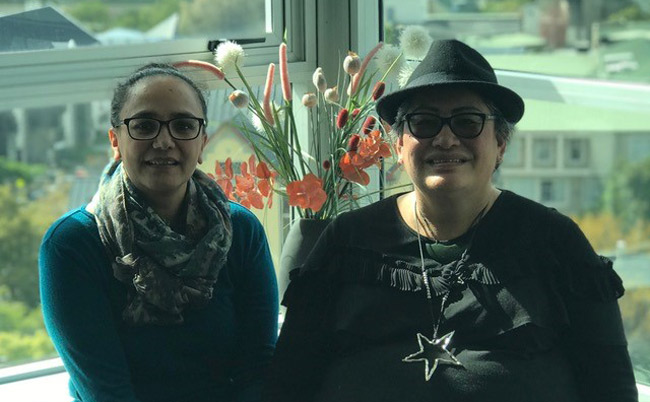Thursday 18 October 2018 10:25pm

The co-chairs of Te Poutama Māori: Dr Diane Ruwhiu (left) and Tangiwai Rewi.
The newest co-chair of the University of Otago’s Māori academic staff network says she is excited to step up and help steer the group into its second decade.
Te Tumu senior lecturer Tangiwai Rewi has been chosen to succeed Professor Jacinta Ruru as the co-chair of Te Poutama Māori. Professor Ruru has stepped down from the position after co-chairing the group from its inception in 2007.
“I’m excited about taking on the role. I know there’ll be challenges ahead but for me it’s my time to step up and make a contribution,” she says.
"I’m excited about taking on the role. I know there’ll be challenges ahead but for me it’s my time to step up and make a contribution."
“We’ve had Janine Kapa and then Jacinta [Ruru], those two carried the majority of the leadership for a long time. When Janine finished, we had [current co-chair] Diane [Ruwhiu] come through. Now it’s my time to contribute.”
Sitting in the co-chair’s seat also marks a return of sorts for Mrs Rewi, who has been supported by her peers to steer clear of responsibilities within the group while completing her PhD and working as a senior lecturer with Te Tumu. She is due to graduate in December. She had previously been an avid member involved with Te Poutama Māori when she arrived at the University of Otago in 2008.
“Having been there in the early stages, enjoying the collegiality activities, to watching the group grow into what Te Poutama Maori is now – hosting seminars, putting on writing retreats, actually holding bi-monthly meetings and being able to represent the Māori academic voice here on campus by putting causes out there we think are dear to our hearts– it’s great.”
Te Poutama Māori was founded with a desire to grow the cohort of Māori academic staff at the University, and to provide a collective Māori academic voice at strategic representative levels within the university’s decision making structure.
"We also need to think about whether we have actually been able to get the Māori academic voice heard at the decision making table. If we aren’t having that affect, what sort of changes we will need to make to effect change."
A self-confessed “process person”, Mrs Rewi says the mission remains the same. One of her first priorities is to reflect on the group’s first 11 years and see how the group is tracking against its original intentions regarding its terms of reference and strategic priorities.
“We have always had increasing the cohort of Māori academic staff on our radar, even all those years ago and its topical again right now. Those pressures are on us even more so because of the large number of Māori students coming through.
“We also need to think about whether we have actually been able to get the Māori academic voice heard at the decision making table. If we aren’t having that affect, what sort of changes we will need to make to effect change.”
Mrs Rewi heeds the comforting words of her late grand uncle, respected Waikato kaumātua, Te Motu Iti o Rongo Mai Te Hoe Katipa as she embarks on the journey ahead.
“ E oi i a koe, e oi i a kōrua, e oi i a koutou. Take care of yourself, take care of yourselves (two people), take care of yourselves (three or more people).”
